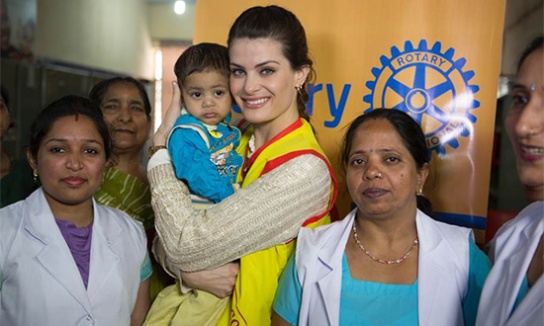
Two years ago, U.S. Rotary members in Maine set out to improve the education system in Bikaner, Rajasthan, an Indian city near the border of Pakistan.
The Rotary Club of Kennebunk Portside chose Bikaner because club member Rohit Mehta was originally from the area and had connections there. Mehta put the club in contact with Rotarians in India to provide desks for four government-run schools.
But when community leaders returned with a request for more desks, the Maine Rotarians decided they had to think bigger. The Rotary Foundation had rolled out its new grant model, which required that the club do more than just purchase school furniture to qualify for global grant funding. Club leaders put their heads together and turned a simple project to provide school desks into a global grant project by adding a campaign to recruit new students and professional development for teachers.
“Because the new grant standards required further thought, a superior grant emerged,” notes Peter Johnson, Rotary Foundation chair for District 7780, which covers Maine. “Additional questions were asked, which boil down to, ‘OK, they need benches [desks] and you want to help them get their benches, but what’s going to happen with these benches?’ The standards dramatically improved the project’s scope, tone, and tenor.”
The Rotary clubs worked with School Management Committees — teams of school administrators, community leaders, and Bikaner Rotary members — to determine what each school needed most. They discovered that the children were unschooled and had never sat in a classroom before. So the committees decided it would be easier to get the students to commit to a three-day-a-week lesson plan. That left the other two days for the same benches to be used for teacher training.
“The teachers at the government schools are well qualified, but they provide an education within the framework of their stipulated syllabus only,” says Man Mohan Kalyani, project leader for the Bikaner club. “This does not include many things that are needed for the overall development of the students. So we set about supporting both teachers and students with these additional skills.”
The global grant will provide desks for 1,685 students. The training will target 240 teachers. In addition to instruction in basic subjects, the curriculum aims to improve students’ self-confidence, communication skills, leadership skills, and personality development. The clubs expect the program will have even better results than the earlier shipment of desks, which helped improve grades by 23 percent in the four recipient schools. Those results alone led regional authorities to select two of the schools as sites for annual examinations, meaning local students did not have to travel 15 miles to another city to take the exam.
Cornelia Stockman, a member of the Maine club, traveled to Bikaner early in the grant planning process. She said she was impressed by the level of commitment and professionalism displayed by the School Management Committees.
Stockman said local families who can afford it send their children to private schools with classrooms and desks. By contrast, students at the government-owned schools sit on the ground in an open area surrounded by security walls and gates. There is no compulsory attendance beyond sixth grade. The local education experts insist the students are more likely to stay in school if they have a desk to sit at, Stockman says.
Mehta is thankful the grant was able to help his native country.
“I thought it would be great if we could do something with a region that I had ties to,” Mehta says. “And good education is fundamental to the quality of life.”
Stockman said even though the process of expanding the project’s scope was not without bumps, the Bikaner community responded to every need as the grant application evolved.
“We had to go back to them three or four times, but every time we asked them to do something else, they did it,” she recalls. “They never gave up, and did everything necessary to meet the requirements of the global grant.”
Learn more about global grants
Download a tutorial on using the online application process
Rotary News




